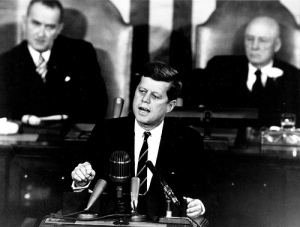The Puzzle of Religion in US Presidential Politics
| Date: | 11 October 2012 |
| Author: | Religion Factor |

With the count down on till the USA votes for its next President, The Religion Factor reflects on the role of religion in this important process.
Foreign observers of the 2012 US presidential campaign may be forgiven for being puzzled by the role of religion in American politics.
On the one hand, there is the larger mystery: how can a country whose 1st constitutional amendment so clearly states that its government may not ‘establish’ (subsidize or otherwise officially promote) any particular religion nonetheless have mottos like ‘In God we trust’ on its coins and be so preoccupied with faith-based issues in its political debate? And on the other hand, there is the smaller, more immediate mystery: if religion does matter so much politically, why has neither presidential candidate wanted to capitalize on it to motivate voters this time round?
The first mystery, or paradox, is resolved partly by reading just a bit further in the US constitution. On the basis of the first clause of the First Amendment – ‘Congress shall make no law respecting an establishment of religion’ – one might assume that the state is ‘secular’ (literally ‘worldly’) and therefore entirely ‘non-’ or even ‘anti-religious’. But the second clause is crucial; it goes on to state that congress shall make no law ‘ prohibiting the free exercise thereof [religion].’ This puts the state in a balancing act: it can neither promote nor prohibit the exercise of religion. So it cannot easily prevent presidents from concluding their speeches with the phrase ‘God bless America’, something which may seem bizarre in a country with such a sharp separation of church and state. The state is expected to be neutral, not secularist, which can sometimes manifest as opposition or outright hostility to religion.
It is useful here also to distinguish between the American nation and the American state. The state (the governmental administration and bureaucracy) is required to be neutral on religion but the nation (the people) is largely religious (roughly 50% Protestant, 25% Catholic, though the ‘religiously-unaffiliated’ now constitute 20% (http://www.pewforum.org/Unaffiliated/nones-on-the-rise.aspx)). The prevailing cultural assumption is indeed that most people do believe in one God or another. Statements like ‘In God we trust’ and ‘God bless America’ have been held by the courts to leave open interpretation as to ‘which God?’ To sum up, on the first mystery/paradox, the separation of church and state has meant a neutral state, which has left a nation free to pursue and explore belief, which in turn has produced perhaps the most religious of the world’s developed countries.
But that leads to another mystery/paradox: if religion is so important in the US, why hasn’t it featured more strongly in this presidential campaign season? In fact, it did register in the primary elections of the Republican party, where former Penn Senator Rick Santorum emerged and remained as a contender far longer than some expected precisely because he championed family, anti-abortion, school prayer themes, all important to conservative Christian evangelicals who have exercised considerable influence in the Republican Party in the last three decades. But neither Mitt Romney nor Barack Obama is playing the religion card in the general election. In part, this can be explained by the slalom maneuver that candidates make from primary to general elections: in party primaries, they have to appeal to the more extreme, card-carrying members of their own parties to secure nomination; in the general election they have to re-capture the middle of the political spectrum. Swing voters are less particular about religious specifics in politics than core (Republican) voters, so Romney is focusing less on Christian Right themes now.
But more interestingly, both candidates have an ‘ambivalence problem’ on the religion question. Mitt Romney is a devout Mormon, a Christian tradition about which most Americans know little and about which many are suspicious of what little they know. Barack Obama is an unaffiliated Christian (since breaking with the congregation of controversial pastor Jeremiah Wright), but whose Christian commitment is still questioned because of his genealogy. So both candidates are on shaky political ground when it comes to appealing to religion. This is not new in American politicking. Though he considered himself a Christian, albeit an unorthodox one, Thomas Jefferson was lambasted in 1800 as an atheist Jacobin. Abraham Lincoln, who never committed to any particular church but whose rhetoric regularly appealed to ‘God’ (e.g. Gettysburg Address) almost lost a congressional bid in the 1850s because of his irregular religious views. And, of course, the Catholicism of JF Kennedy was considered a major obstacle to Protestant voters in 1960.
The American state may be neutral, but, so far, the American nation tends to expect its leaders to be people of faith, and a popularly acceptable faith at that. Which is why neither candidate this time wants much focus on the details of his own personal beliefs to feature. Not because they don’t have faith, but because it is too difficult to explain.
Sam Van Leer is a Dutch-American with degrees in political science and theology. He is an Anglican priest and representative to the Netherlands Council of Churches.

